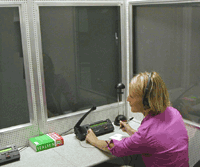Interpreters and judicial trials

If we attend to news published about the work of interpreters in certain recent, high-profile court cases, we might be led to believe that there are no professional translators capable of providing a good service of interpretation between the Basque and Spanish languages.
This is simply not true; there are professional translators, and very good ones at that. But it would appear that the Spanish judicial system is being mean in not paying their interpreters at a genuinely professional level. At EIZIE (the Association of Translators, Correctors and Interpreters in the Basque language), we have information about one example of this: the Audiencia Nacional (the special High Court in Madrid), will not pay the going rates to the interpreters they contract, alleging these tariffs to be «too costly». Given this is what is happening, it is hardly surprising that, on not insisting on any criteria of quality, they take on beginners or, quite, simply, those who are available at the time. This happens not only with respect to Basque, but also with many other languages (Rumanian, Arabic, Kurdish, and so on).
Moreover, given the tiring and sometimes totally unreasonable conditions under which they are obliged to work, even the best professional interpreters may err - long hours of continuous working, often in a highly charged atmosphere; unsuitable or adverse work materials that cannot guarantee the intimacy of the interpreter; and remuneration that is quite frankly an obstacle to professionalism in the work of interpretation.
The use of Euskera (Basque) as a language is protected by the Spanish Constitution. The right of citizens to express themselves in the Basque language in a court of justice has the concomitant obligation, as we understand it, for the judicial authorities to provide a suitable interpretation service. At times, because of this, the right of accused persons to defend themselves in a genuinely effective way can be undermined.
Having knowledge of the Law does not automatically give someone the right to be a judge. Likewise, just knowing two languages does not convert someone into a translator or interpreter. The recent stream of news items about the «unfortunate translations» of translators in court hearings do not help in any way to give a good image to society at large of our profession. We believe that official bodies and especially the administration of the judicial system should provide the wherewithal to resolve this situation as soon as possible.
Joseba Ossa, President of EIZIE (www.eizie.org)



